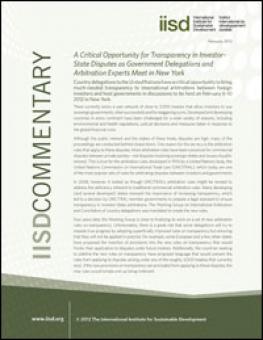
A Critical Opportunity for Transparency in Investor-State Disputes as Government Delegations and Arbitration Experts Meet in New York
Country delegations to the United Nations have a critical opportunity to bring much-needed transparency to international arbitrations between foreign investors and host governments in discussions to be held on February 6-10, 2012 in New York.
In 2008, it looked as though the arbitration rules developed in 1976 by a United Nations body, the United Nations Commission on International Trade Law (UNCITRAL), might be revised to address the lack of transparency in arbitration proceedings under the rules. Many developing (and several developed) states stressed the importance of increasing transparency, which led to a decision by UNCITRAL member governments to prepare a legal standard to ensure transparency in investor-state arbitrations. The Working Group on International Arbitration and Conciliation of country delegations was mandated to create the new rules.
Four years later, the Working Group is close to finalizing its work on a set of new arbitration rules on transparency. Unfortunately, there is a great risk that some delegations will try to impede true progress by adopting superficially improved rules on transparency but ensuring that they will not be applied in practice.
You might also be interested in
Why the Energy Charter Treaty Modernization Doesn't Deliver for Climate
The Energy Charter Conference adopted the "modernized" Energy Charter Treaty (ECT) on December 3, 2024. IISD's Lukas Schaugg explains what the modernization does, when it will enter into force, its tension with EU law, and why the reformed ECT can still hinder climate policies.
The Responsible Agricultural Investment Tool for Agribusiness and Case Studies
This report summarizes a collaboration to support agribusinesses in complying with principles of responsible investment in agriculture and food systems.
Stabilization Clauses: The hidden provisions that can hinder tax and investment policy reform
Stabilization clauses should no longer automatically be included in contracts between states and investors. If they are, they should, at a minimum, build on the latest international standards on stabilization to avoid being a barrier to sustainable development.
What Drives Investment Policy-makers in Developing Countries to Use Tax Incentives?
The article explores the reasons behind the use of tax incentives in developing countries to attract investment, examining the pressures, challenges, and alternative strategies that exist.